Analysis of the Evolution of Management Theory & Practice
VerifiedAdded on 2023/01/06
|10
|2966
|81
Essay
AI Summary
This essay provides a comprehensive overview of the evolution of management theory and practice, spanning from the pre-industrial era to the post-industrial period. It begins by examining management practices before the industrial revolution, highlighting aspects such as worker engagement, quality improvement, centralized work systems, and the use of fear-based motivation. The essay then delves into the early development of management as a scientific discipline during the industrial revolution, emphasizing the adoption of scientific methods, employee training, and standardized practices to enhance productivity. Key figures like Taylor, Fayol, and Gantt and their contributions are discussed. Finally, the essay explores the growing sophistication of management in the post-industrial era, highlighting the shift towards service-based economies and the need for advanced communication and coordination strategies. The analysis includes the impact of the industrial revolution, the development of scientific management, and the evolution of management practices and principles. This essay provides a detailed overview of the evolution of management practices and the various aspects of management practices from the industrial revolution to the post industrial era.
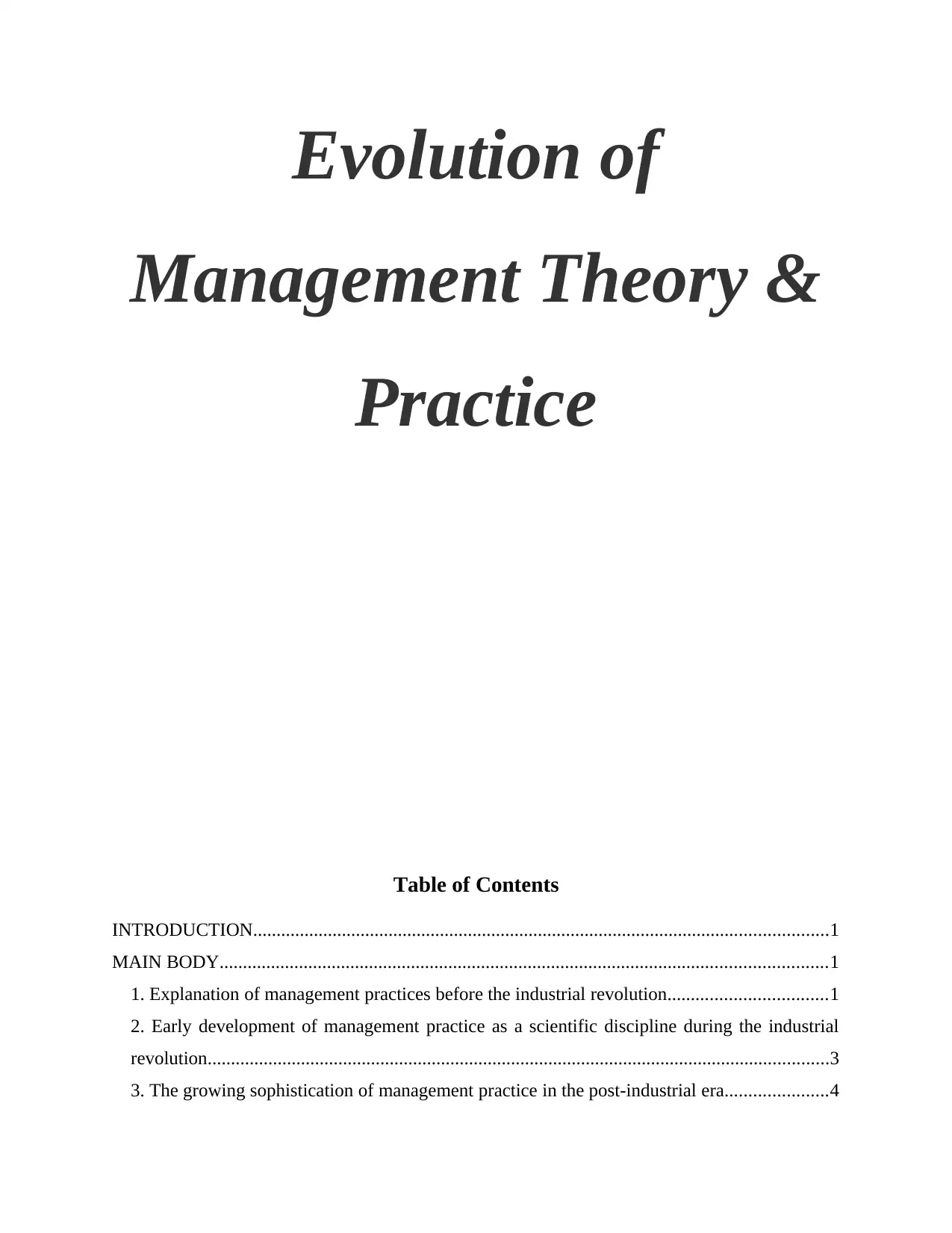
Evolution of
Management Theory &
Practice
Table of Contents
INTRODUCTION...........................................................................................................................1
MAIN BODY..................................................................................................................................1
1. Explanation of management practices before the industrial revolution..................................1
2. Early development of management practice as a scientific discipline during the industrial
revolution.....................................................................................................................................3
3. The growing sophistication of management practice in the post-industrial era......................4
Management Theory &
Practice
Table of Contents
INTRODUCTION...........................................................................................................................1
MAIN BODY..................................................................................................................................1
1. Explanation of management practices before the industrial revolution..................................1
2. Early development of management practice as a scientific discipline during the industrial
revolution.....................................................................................................................................3
3. The growing sophistication of management practice in the post-industrial era......................4
Paraphrase This Document
Need a fresh take? Get an instant paraphrase of this document with our AI Paraphraser

Conclusion.......................................................................................................................................5
REFERENCES................................................................................................................................5
REFERENCES................................................................................................................................5

⊘ This is a preview!⊘
Do you want full access?
Subscribe today to unlock all pages.

Trusted by 1+ million students worldwide
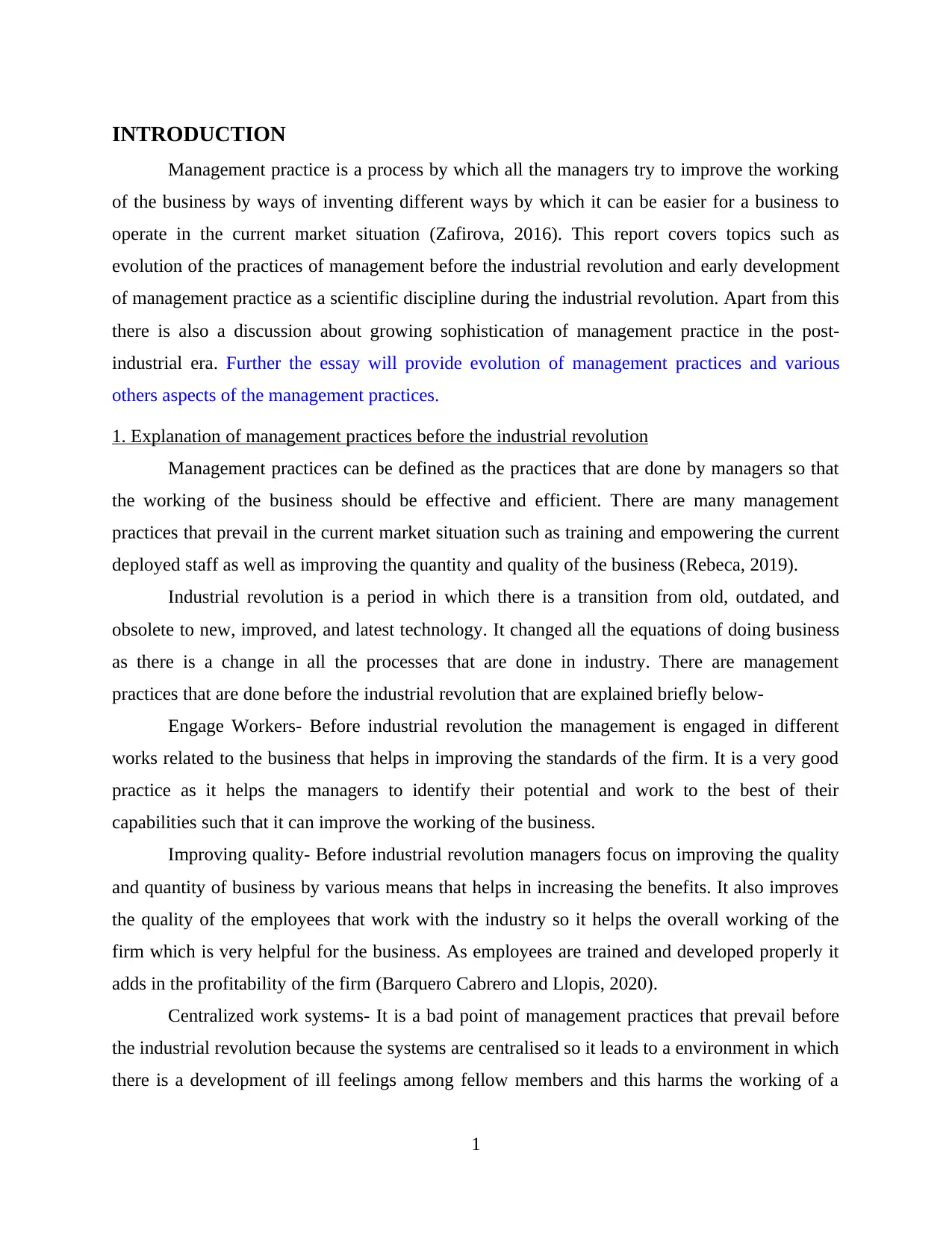
INTRODUCTION
Management practice is a process by which all the managers try to improve the working
of the business by ways of inventing different ways by which it can be easier for a business to
operate in the current market situation (Zafirova, 2016). This report covers topics such as
evolution of the practices of management before the industrial revolution and early development
of management practice as a scientific discipline during the industrial revolution. Apart from this
there is also a discussion about growing sophistication of management practice in the post-
industrial era. Further the essay will provide evolution of management practices and various
others aspects of the management practices.
1. Explanation of management practices before the industrial revolution
Management practices can be defined as the practices that are done by managers so that
the working of the business should be effective and efficient. There are many management
practices that prevail in the current market situation such as training and empowering the current
deployed staff as well as improving the quantity and quality of the business (Rebeca, 2019).
Industrial revolution is a period in which there is a transition from old, outdated, and
obsolete to new, improved, and latest technology. It changed all the equations of doing business
as there is a change in all the processes that are done in industry. There are management
practices that are done before the industrial revolution that are explained briefly below-
Engage Workers- Before industrial revolution the management is engaged in different
works related to the business that helps in improving the standards of the firm. It is a very good
practice as it helps the managers to identify their potential and work to the best of their
capabilities such that it can improve the working of the business.
Improving quality- Before industrial revolution managers focus on improving the quality
and quantity of business by various means that helps in increasing the benefits. It also improves
the quality of the employees that work with the industry so it helps the overall working of the
firm which is very helpful for the business. As employees are trained and developed properly it
adds in the profitability of the firm (Barquero Cabrero and Llopis, 2020).
Centralized work systems- It is a bad point of management practices that prevail before
the industrial revolution because the systems are centralised so it leads to a environment in which
there is a development of ill feelings among fellow members and this harms the working of a
1
Management practice is a process by which all the managers try to improve the working
of the business by ways of inventing different ways by which it can be easier for a business to
operate in the current market situation (Zafirova, 2016). This report covers topics such as
evolution of the practices of management before the industrial revolution and early development
of management practice as a scientific discipline during the industrial revolution. Apart from this
there is also a discussion about growing sophistication of management practice in the post-
industrial era. Further the essay will provide evolution of management practices and various
others aspects of the management practices.
1. Explanation of management practices before the industrial revolution
Management practices can be defined as the practices that are done by managers so that
the working of the business should be effective and efficient. There are many management
practices that prevail in the current market situation such as training and empowering the current
deployed staff as well as improving the quantity and quality of the business (Rebeca, 2019).
Industrial revolution is a period in which there is a transition from old, outdated, and
obsolete to new, improved, and latest technology. It changed all the equations of doing business
as there is a change in all the processes that are done in industry. There are management
practices that are done before the industrial revolution that are explained briefly below-
Engage Workers- Before industrial revolution the management is engaged in different
works related to the business that helps in improving the standards of the firm. It is a very good
practice as it helps the managers to identify their potential and work to the best of their
capabilities such that it can improve the working of the business.
Improving quality- Before industrial revolution managers focus on improving the quality
and quantity of business by various means that helps in increasing the benefits. It also improves
the quality of the employees that work with the industry so it helps the overall working of the
firm which is very helpful for the business. As employees are trained and developed properly it
adds in the profitability of the firm (Barquero Cabrero and Llopis, 2020).
Centralized work systems- It is a bad point of management practices that prevail before
the industrial revolution because the systems are centralised so it leads to a environment in which
there is a development of ill feelings among fellow members and this harms the working of a
1
Paraphrase This Document
Need a fresh take? Get an instant paraphrase of this document with our AI Paraphraser
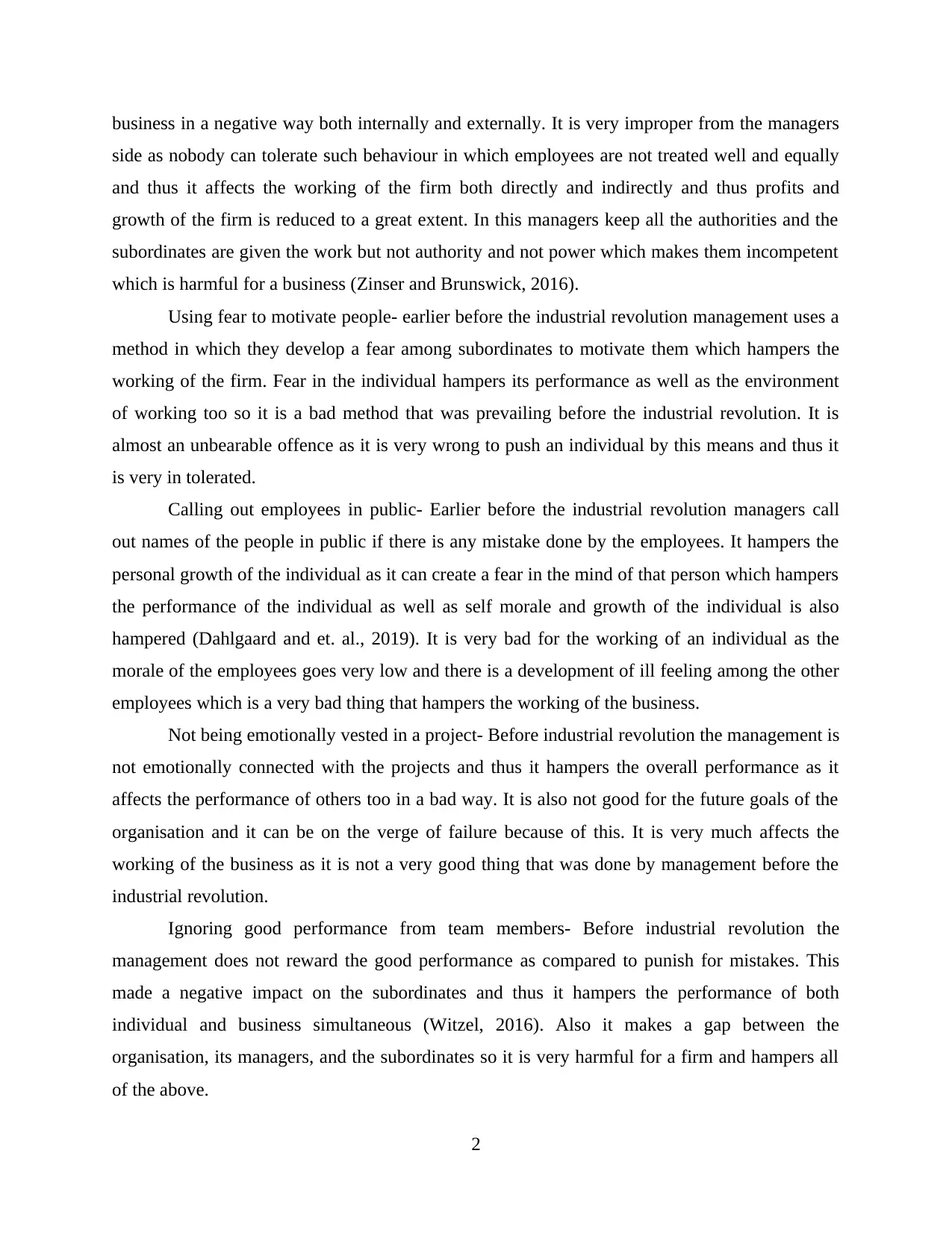
business in a negative way both internally and externally. It is very improper from the managers
side as nobody can tolerate such behaviour in which employees are not treated well and equally
and thus it affects the working of the firm both directly and indirectly and thus profits and
growth of the firm is reduced to a great extent. In this managers keep all the authorities and the
subordinates are given the work but not authority and not power which makes them incompetent
which is harmful for a business (Zinser and Brunswick, 2016).
Using fear to motivate people- earlier before the industrial revolution management uses a
method in which they develop a fear among subordinates to motivate them which hampers the
working of the firm. Fear in the individual hampers its performance as well as the environment
of working too so it is a bad method that was prevailing before the industrial revolution. It is
almost an unbearable offence as it is very wrong to push an individual by this means and thus it
is very in tolerated.
Calling out employees in public- Earlier before the industrial revolution managers call
out names of the people in public if there is any mistake done by the employees. It hampers the
personal growth of the individual as it can create a fear in the mind of that person which hampers
the performance of the individual as well as self morale and growth of the individual is also
hampered (Dahlgaard and et. al., 2019). It is very bad for the working of an individual as the
morale of the employees goes very low and there is a development of ill feeling among the other
employees which is a very bad thing that hampers the working of the business.
Not being emotionally vested in a project- Before industrial revolution the management is
not emotionally connected with the projects and thus it hampers the overall performance as it
affects the performance of others too in a bad way. It is also not good for the future goals of the
organisation and it can be on the verge of failure because of this. It is very much affects the
working of the business as it is not a very good thing that was done by management before the
industrial revolution.
Ignoring good performance from team members- Before industrial revolution the
management does not reward the good performance as compared to punish for mistakes. This
made a negative impact on the subordinates and thus it hampers the performance of both
individual and business simultaneous (Witzel, 2016). Also it makes a gap between the
organisation, its managers, and the subordinates so it is very harmful for a firm and hampers all
of the above.
2
side as nobody can tolerate such behaviour in which employees are not treated well and equally
and thus it affects the working of the firm both directly and indirectly and thus profits and
growth of the firm is reduced to a great extent. In this managers keep all the authorities and the
subordinates are given the work but not authority and not power which makes them incompetent
which is harmful for a business (Zinser and Brunswick, 2016).
Using fear to motivate people- earlier before the industrial revolution management uses a
method in which they develop a fear among subordinates to motivate them which hampers the
working of the firm. Fear in the individual hampers its performance as well as the environment
of working too so it is a bad method that was prevailing before the industrial revolution. It is
almost an unbearable offence as it is very wrong to push an individual by this means and thus it
is very in tolerated.
Calling out employees in public- Earlier before the industrial revolution managers call
out names of the people in public if there is any mistake done by the employees. It hampers the
personal growth of the individual as it can create a fear in the mind of that person which hampers
the performance of the individual as well as self morale and growth of the individual is also
hampered (Dahlgaard and et. al., 2019). It is very bad for the working of an individual as the
morale of the employees goes very low and there is a development of ill feeling among the other
employees which is a very bad thing that hampers the working of the business.
Not being emotionally vested in a project- Before industrial revolution the management is
not emotionally connected with the projects and thus it hampers the overall performance as it
affects the performance of others too in a bad way. It is also not good for the future goals of the
organisation and it can be on the verge of failure because of this. It is very much affects the
working of the business as it is not a very good thing that was done by management before the
industrial revolution.
Ignoring good performance from team members- Before industrial revolution the
management does not reward the good performance as compared to punish for mistakes. This
made a negative impact on the subordinates and thus it hampers the performance of both
individual and business simultaneous (Witzel, 2016). Also it makes a gap between the
organisation, its managers, and the subordinates so it is very harmful for a firm and hampers all
of the above.
2
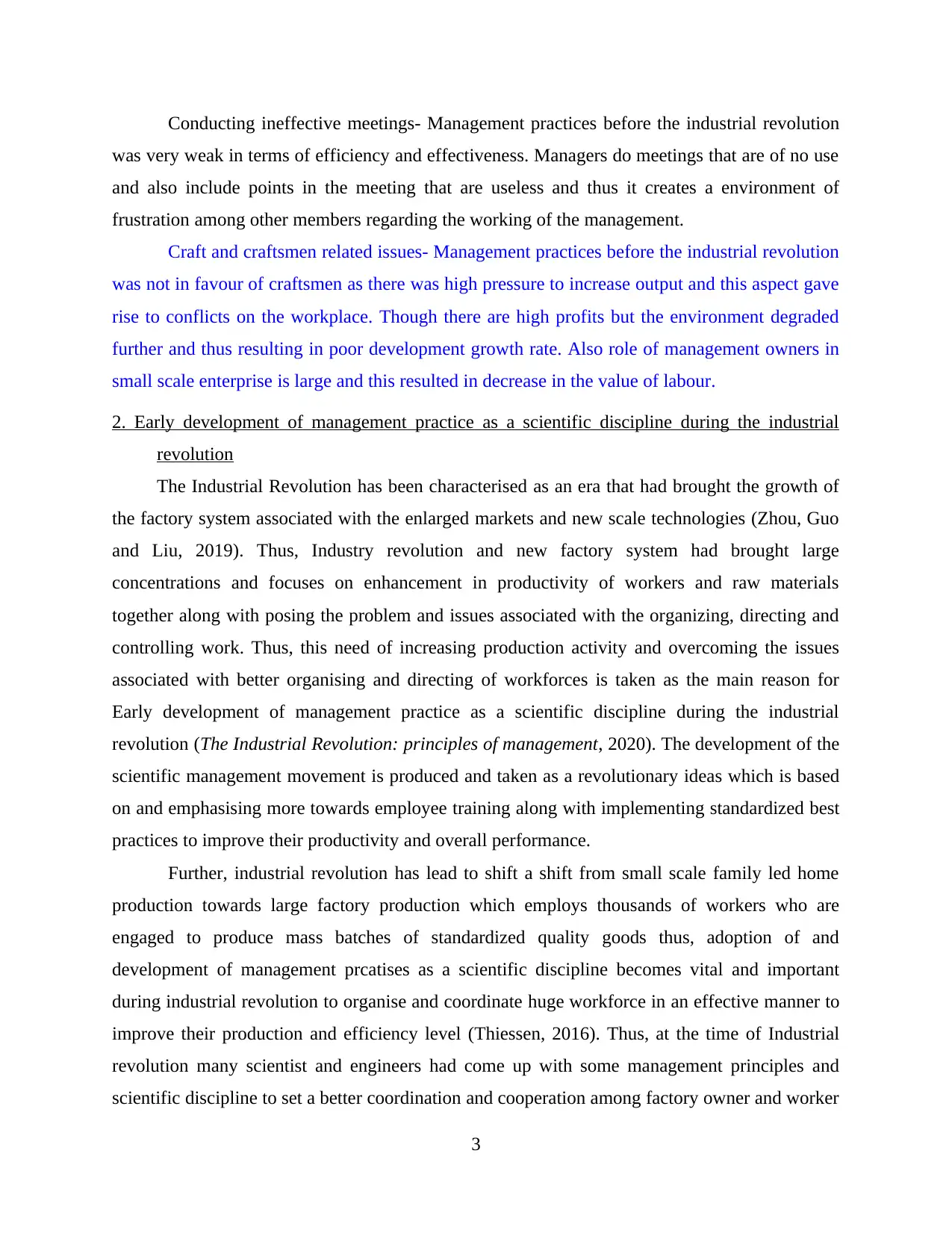
Conducting ineffective meetings- Management practices before the industrial revolution
was very weak in terms of efficiency and effectiveness. Managers do meetings that are of no use
and also include points in the meeting that are useless and thus it creates a environment of
frustration among other members regarding the working of the management.
Craft and craftsmen related issues- Management practices before the industrial revolution
was not in favour of craftsmen as there was high pressure to increase output and this aspect gave
rise to conflicts on the workplace. Though there are high profits but the environment degraded
further and thus resulting in poor development growth rate. Also role of management owners in
small scale enterprise is large and this resulted in decrease in the value of labour.
2. Early development of management practice as a scientific discipline during the industrial
revolution
The Industrial Revolution has been characterised as an era that had brought the growth of
the factory system associated with the enlarged markets and new scale technologies (Zhou, Guo
and Liu, 2019). Thus, Industry revolution and new factory system had brought large
concentrations and focuses on enhancement in productivity of workers and raw materials
together along with posing the problem and issues associated with the organizing, directing and
controlling work. Thus, this need of increasing production activity and overcoming the issues
associated with better organising and directing of workforces is taken as the main reason for
Early development of management practice as a scientific discipline during the industrial
revolution (The Industrial Revolution: principles of management, 2020). The development of the
scientific management movement is produced and taken as a revolutionary ideas which is based
on and emphasising more towards employee training along with implementing standardized best
practices to improve their productivity and overall performance.
Further, industrial revolution has lead to shift a shift from small scale family led home
production towards large factory production which employs thousands of workers who are
engaged to produce mass batches of standardized quality goods thus, adoption of and
development of management prcatises as a scientific discipline becomes vital and important
during industrial revolution to organise and coordinate huge workforce in an effective manner to
improve their production and efficiency level (Thiessen, 2016). Thus, at the time of Industrial
revolution many scientist and engineers had come up with some management principles and
scientific discipline to set a better coordination and cooperation among factory owner and worker
3
was very weak in terms of efficiency and effectiveness. Managers do meetings that are of no use
and also include points in the meeting that are useless and thus it creates a environment of
frustration among other members regarding the working of the management.
Craft and craftsmen related issues- Management practices before the industrial revolution
was not in favour of craftsmen as there was high pressure to increase output and this aspect gave
rise to conflicts on the workplace. Though there are high profits but the environment degraded
further and thus resulting in poor development growth rate. Also role of management owners in
small scale enterprise is large and this resulted in decrease in the value of labour.
2. Early development of management practice as a scientific discipline during the industrial
revolution
The Industrial Revolution has been characterised as an era that had brought the growth of
the factory system associated with the enlarged markets and new scale technologies (Zhou, Guo
and Liu, 2019). Thus, Industry revolution and new factory system had brought large
concentrations and focuses on enhancement in productivity of workers and raw materials
together along with posing the problem and issues associated with the organizing, directing and
controlling work. Thus, this need of increasing production activity and overcoming the issues
associated with better organising and directing of workforces is taken as the main reason for
Early development of management practice as a scientific discipline during the industrial
revolution (The Industrial Revolution: principles of management, 2020). The development of the
scientific management movement is produced and taken as a revolutionary ideas which is based
on and emphasising more towards employee training along with implementing standardized best
practices to improve their productivity and overall performance.
Further, industrial revolution has lead to shift a shift from small scale family led home
production towards large factory production which employs thousands of workers who are
engaged to produce mass batches of standardized quality goods thus, adoption of and
development of management prcatises as a scientific discipline becomes vital and important
during industrial revolution to organise and coordinate huge workforce in an effective manner to
improve their production and efficiency level (Thiessen, 2016). Thus, at the time of Industrial
revolution many scientist and engineers had come up with some management principles and
scientific discipline to set a better coordination and cooperation among factory owner and worker
3
⊘ This is a preview!⊘
Do you want full access?
Subscribe today to unlock all pages.

Trusted by 1+ million students worldwide
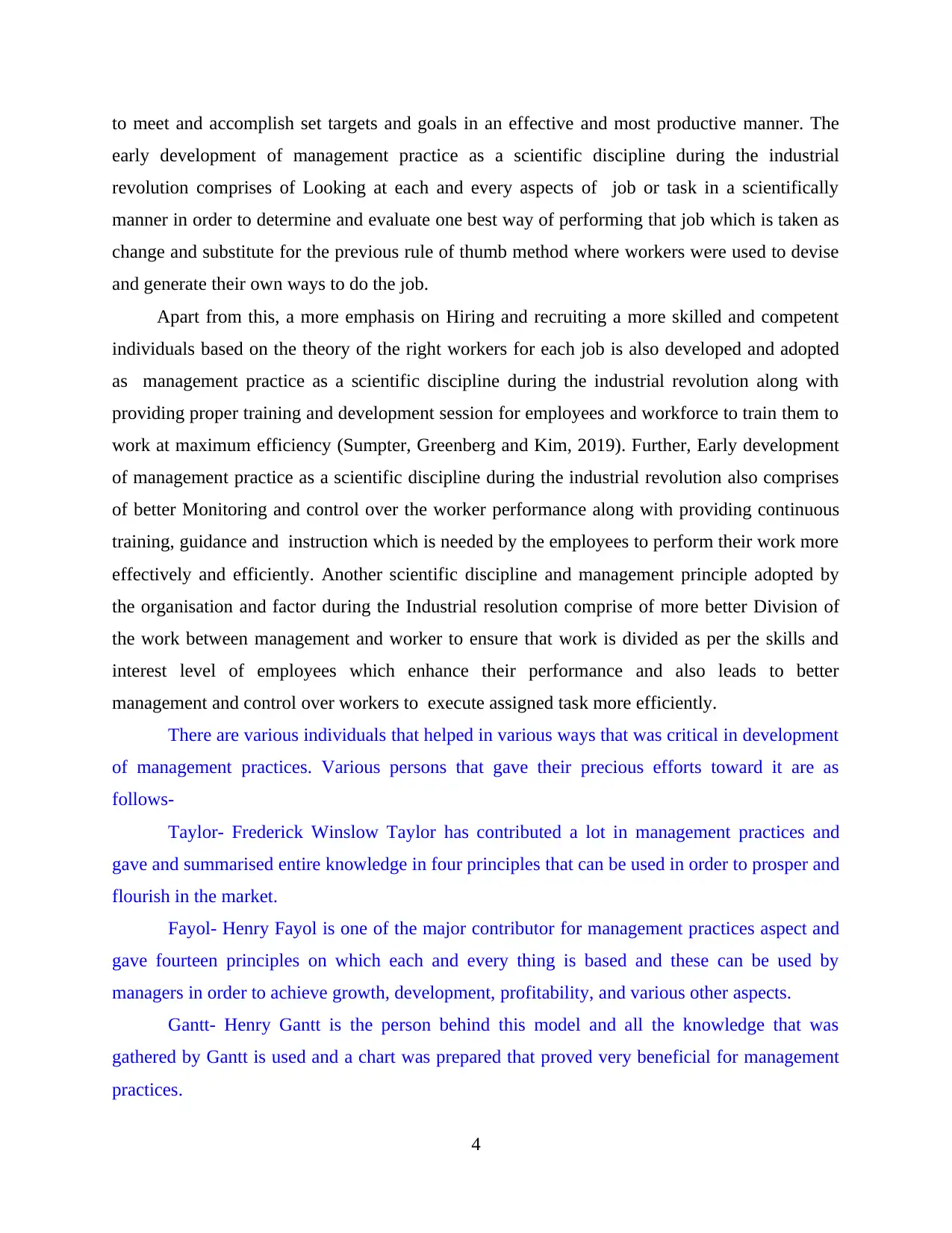
to meet and accomplish set targets and goals in an effective and most productive manner. The
early development of management practice as a scientific discipline during the industrial
revolution comprises of Looking at each and every aspects of job or task in a scientifically
manner in order to determine and evaluate one best way of performing that job which is taken as
change and substitute for the previous rule of thumb method where workers were used to devise
and generate their own ways to do the job.
Apart from this, a more emphasis on Hiring and recruiting a more skilled and competent
individuals based on the theory of the right workers for each job is also developed and adopted
as management practice as a scientific discipline during the industrial revolution along with
providing proper training and development session for employees and workforce to train them to
work at maximum efficiency (Sumpter, Greenberg and Kim, 2019). Further, Early development
of management practice as a scientific discipline during the industrial revolution also comprises
of better Monitoring and control over the worker performance along with providing continuous
training, guidance and instruction which is needed by the employees to perform their work more
effectively and efficiently. Another scientific discipline and management principle adopted by
the organisation and factor during the Industrial resolution comprise of more better Division of
the work between management and worker to ensure that work is divided as per the skills and
interest level of employees which enhance their performance and also leads to better
management and control over workers to execute assigned task more efficiently.
There are various individuals that helped in various ways that was critical in development
of management practices. Various persons that gave their precious efforts toward it are as
follows-
Taylor- Frederick Winslow Taylor has contributed a lot in management practices and
gave and summarised entire knowledge in four principles that can be used in order to prosper and
flourish in the market.
Fayol- Henry Fayol is one of the major contributor for management practices aspect and
gave fourteen principles on which each and every thing is based and these can be used by
managers in order to achieve growth, development, profitability, and various other aspects.
Gantt- Henry Gantt is the person behind this model and all the knowledge that was
gathered by Gantt is used and a chart was prepared that proved very beneficial for management
practices.
4
early development of management practice as a scientific discipline during the industrial
revolution comprises of Looking at each and every aspects of job or task in a scientifically
manner in order to determine and evaluate one best way of performing that job which is taken as
change and substitute for the previous rule of thumb method where workers were used to devise
and generate their own ways to do the job.
Apart from this, a more emphasis on Hiring and recruiting a more skilled and competent
individuals based on the theory of the right workers for each job is also developed and adopted
as management practice as a scientific discipline during the industrial revolution along with
providing proper training and development session for employees and workforce to train them to
work at maximum efficiency (Sumpter, Greenberg and Kim, 2019). Further, Early development
of management practice as a scientific discipline during the industrial revolution also comprises
of better Monitoring and control over the worker performance along with providing continuous
training, guidance and instruction which is needed by the employees to perform their work more
effectively and efficiently. Another scientific discipline and management principle adopted by
the organisation and factor during the Industrial resolution comprise of more better Division of
the work between management and worker to ensure that work is divided as per the skills and
interest level of employees which enhance their performance and also leads to better
management and control over workers to execute assigned task more efficiently.
There are various individuals that helped in various ways that was critical in development
of management practices. Various persons that gave their precious efforts toward it are as
follows-
Taylor- Frederick Winslow Taylor has contributed a lot in management practices and
gave and summarised entire knowledge in four principles that can be used in order to prosper and
flourish in the market.
Fayol- Henry Fayol is one of the major contributor for management practices aspect and
gave fourteen principles on which each and every thing is based and these can be used by
managers in order to achieve growth, development, profitability, and various other aspects.
Gantt- Henry Gantt is the person behind this model and all the knowledge that was
gathered by Gantt is used and a chart was prepared that proved very beneficial for management
practices.
4
Paraphrase This Document
Need a fresh take? Get an instant paraphrase of this document with our AI Paraphraser
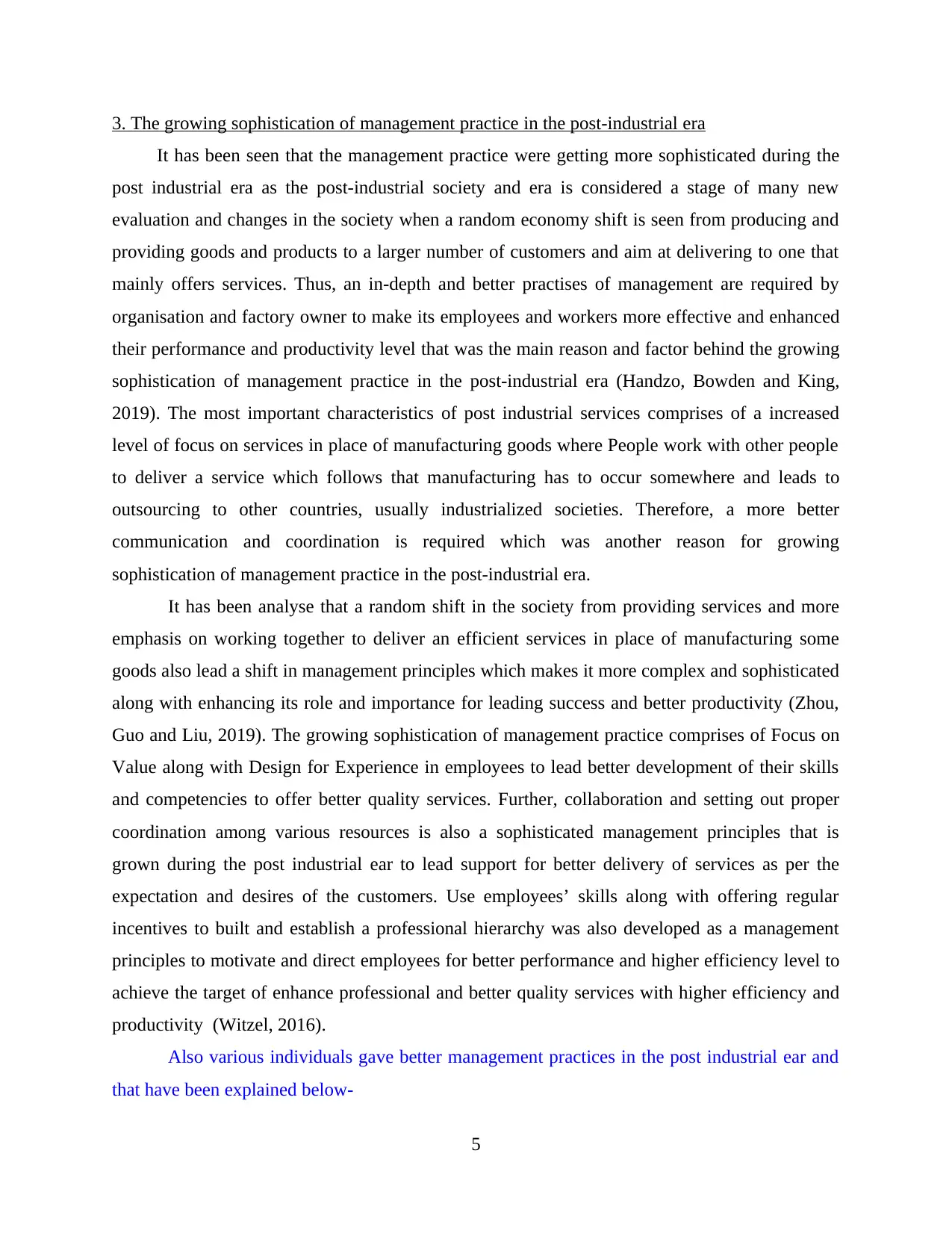
3. The growing sophistication of management practice in the post-industrial era
It has been seen that the management practice were getting more sophisticated during the
post industrial era as the post-industrial society and era is considered a stage of many new
evaluation and changes in the society when a random economy shift is seen from producing and
providing goods and products to a larger number of customers and aim at delivering to one that
mainly offers services. Thus, an in-depth and better practises of management are required by
organisation and factory owner to make its employees and workers more effective and enhanced
their performance and productivity level that was the main reason and factor behind the growing
sophistication of management practice in the post-industrial era (Handzo, Bowden and King,
2019). The most important characteristics of post industrial services comprises of a increased
level of focus on services in place of manufacturing goods where People work with other people
to deliver a service which follows that manufacturing has to occur somewhere and leads to
outsourcing to other countries, usually industrialized societies. Therefore, a more better
communication and coordination is required which was another reason for growing
sophistication of management practice in the post-industrial era.
It has been analyse that a random shift in the society from providing services and more
emphasis on working together to deliver an efficient services in place of manufacturing some
goods also lead a shift in management principles which makes it more complex and sophisticated
along with enhancing its role and importance for leading success and better productivity (Zhou,
Guo and Liu, 2019). The growing sophistication of management practice comprises of Focus on
Value along with Design for Experience in employees to lead better development of their skills
and competencies to offer better quality services. Further, collaboration and setting out proper
coordination among various resources is also a sophisticated management principles that is
grown during the post industrial ear to lead support for better delivery of services as per the
expectation and desires of the customers. Use employees’ skills along with offering regular
incentives to built and establish a professional hierarchy was also developed as a management
principles to motivate and direct employees for better performance and higher efficiency level to
achieve the target of enhance professional and better quality services with higher efficiency and
productivity (Witzel, 2016).
Also various individuals gave better management practices in the post industrial ear and
that have been explained below-
5
It has been seen that the management practice were getting more sophisticated during the
post industrial era as the post-industrial society and era is considered a stage of many new
evaluation and changes in the society when a random economy shift is seen from producing and
providing goods and products to a larger number of customers and aim at delivering to one that
mainly offers services. Thus, an in-depth and better practises of management are required by
organisation and factory owner to make its employees and workers more effective and enhanced
their performance and productivity level that was the main reason and factor behind the growing
sophistication of management practice in the post-industrial era (Handzo, Bowden and King,
2019). The most important characteristics of post industrial services comprises of a increased
level of focus on services in place of manufacturing goods where People work with other people
to deliver a service which follows that manufacturing has to occur somewhere and leads to
outsourcing to other countries, usually industrialized societies. Therefore, a more better
communication and coordination is required which was another reason for growing
sophistication of management practice in the post-industrial era.
It has been analyse that a random shift in the society from providing services and more
emphasis on working together to deliver an efficient services in place of manufacturing some
goods also lead a shift in management principles which makes it more complex and sophisticated
along with enhancing its role and importance for leading success and better productivity (Zhou,
Guo and Liu, 2019). The growing sophistication of management practice comprises of Focus on
Value along with Design for Experience in employees to lead better development of their skills
and competencies to offer better quality services. Further, collaboration and setting out proper
coordination among various resources is also a sophisticated management principles that is
grown during the post industrial ear to lead support for better delivery of services as per the
expectation and desires of the customers. Use employees’ skills along with offering regular
incentives to built and establish a professional hierarchy was also developed as a management
principles to motivate and direct employees for better performance and higher efficiency level to
achieve the target of enhance professional and better quality services with higher efficiency and
productivity (Witzel, 2016).
Also various individuals gave better management practices in the post industrial ear and
that have been explained below-
5
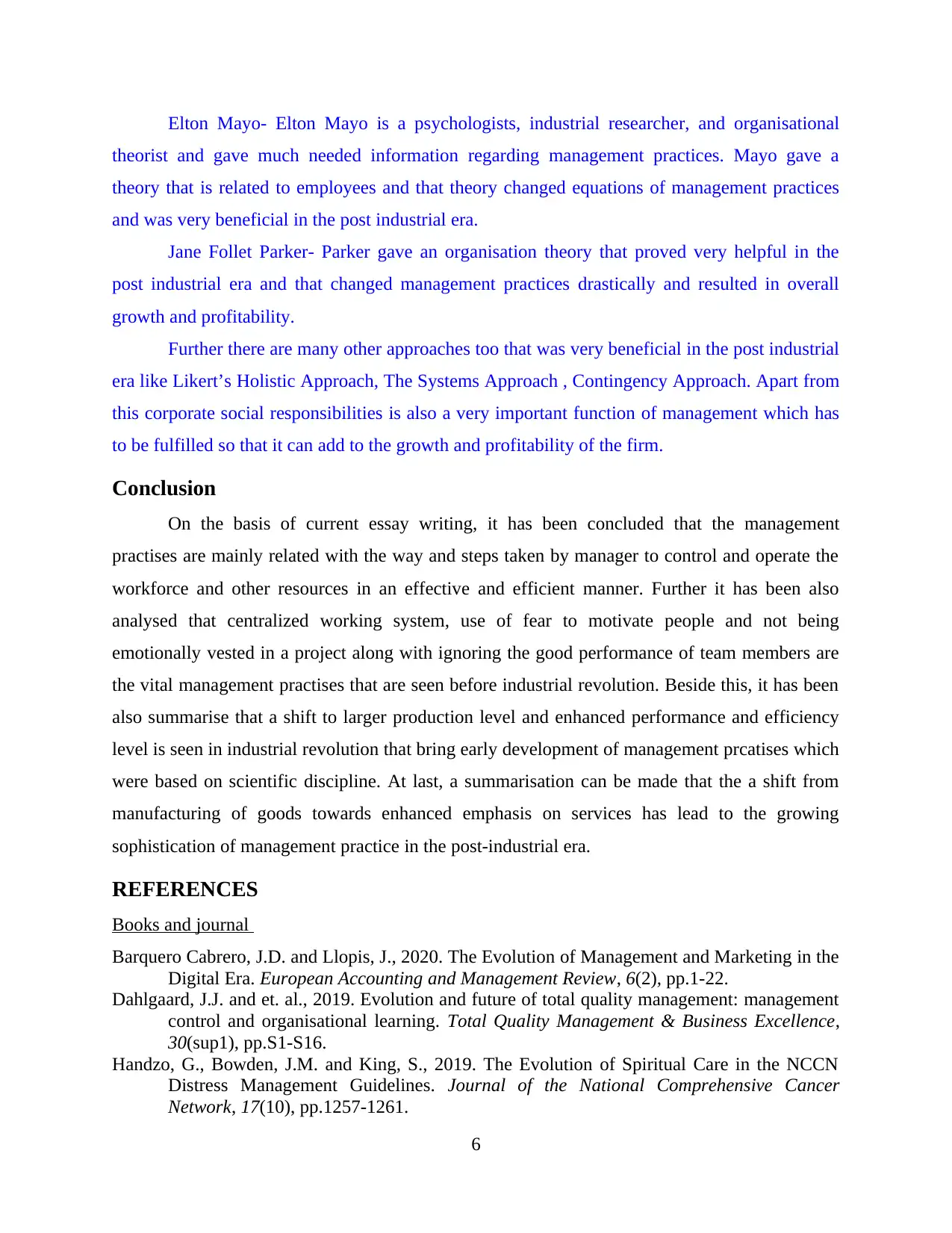
Elton Mayo- Elton Mayo is a psychologists, industrial researcher, and organisational
theorist and gave much needed information regarding management practices. Mayo gave a
theory that is related to employees and that theory changed equations of management practices
and was very beneficial in the post industrial era.
Jane Follet Parker- Parker gave an organisation theory that proved very helpful in the
post industrial era and that changed management practices drastically and resulted in overall
growth and profitability.
Further there are many other approaches too that was very beneficial in the post industrial
era like Likert’s Holistic Approach, The Systems Approach , Contingency Approach. Apart from
this corporate social responsibilities is also a very important function of management which has
to be fulfilled so that it can add to the growth and profitability of the firm.
Conclusion
On the basis of current essay writing, it has been concluded that the management
practises are mainly related with the way and steps taken by manager to control and operate the
workforce and other resources in an effective and efficient manner. Further it has been also
analysed that centralized working system, use of fear to motivate people and not being
emotionally vested in a project along with ignoring the good performance of team members are
the vital management practises that are seen before industrial revolution. Beside this, it has been
also summarise that a shift to larger production level and enhanced performance and efficiency
level is seen in industrial revolution that bring early development of management prcatises which
were based on scientific discipline. At last, a summarisation can be made that the a shift from
manufacturing of goods towards enhanced emphasis on services has lead to the growing
sophistication of management practice in the post-industrial era.
REFERENCES
Books and journal
Barquero Cabrero, J.D. and Llopis, J., 2020. The Evolution of Management and Marketing in the
Digital Era. European Accounting and Management Review, 6(2), pp.1-22.
Dahlgaard, J.J. and et. al., 2019. Evolution and future of total quality management: management
control and organisational learning. Total Quality Management & Business Excellence,
30(sup1), pp.S1-S16.
Handzo, G., Bowden, J.M. and King, S., 2019. The Evolution of Spiritual Care in the NCCN
Distress Management Guidelines. Journal of the National Comprehensive Cancer
Network, 17(10), pp.1257-1261.
6
theorist and gave much needed information regarding management practices. Mayo gave a
theory that is related to employees and that theory changed equations of management practices
and was very beneficial in the post industrial era.
Jane Follet Parker- Parker gave an organisation theory that proved very helpful in the
post industrial era and that changed management practices drastically and resulted in overall
growth and profitability.
Further there are many other approaches too that was very beneficial in the post industrial
era like Likert’s Holistic Approach, The Systems Approach , Contingency Approach. Apart from
this corporate social responsibilities is also a very important function of management which has
to be fulfilled so that it can add to the growth and profitability of the firm.
Conclusion
On the basis of current essay writing, it has been concluded that the management
practises are mainly related with the way and steps taken by manager to control and operate the
workforce and other resources in an effective and efficient manner. Further it has been also
analysed that centralized working system, use of fear to motivate people and not being
emotionally vested in a project along with ignoring the good performance of team members are
the vital management practises that are seen before industrial revolution. Beside this, it has been
also summarise that a shift to larger production level and enhanced performance and efficiency
level is seen in industrial revolution that bring early development of management prcatises which
were based on scientific discipline. At last, a summarisation can be made that the a shift from
manufacturing of goods towards enhanced emphasis on services has lead to the growing
sophistication of management practice in the post-industrial era.
REFERENCES
Books and journal
Barquero Cabrero, J.D. and Llopis, J., 2020. The Evolution of Management and Marketing in the
Digital Era. European Accounting and Management Review, 6(2), pp.1-22.
Dahlgaard, J.J. and et. al., 2019. Evolution and future of total quality management: management
control and organisational learning. Total Quality Management & Business Excellence,
30(sup1), pp.S1-S16.
Handzo, G., Bowden, J.M. and King, S., 2019. The Evolution of Spiritual Care in the NCCN
Distress Management Guidelines. Journal of the National Comprehensive Cancer
Network, 17(10), pp.1257-1261.
6
⊘ This is a preview!⊘
Do you want full access?
Subscribe today to unlock all pages.

Trusted by 1+ million students worldwide
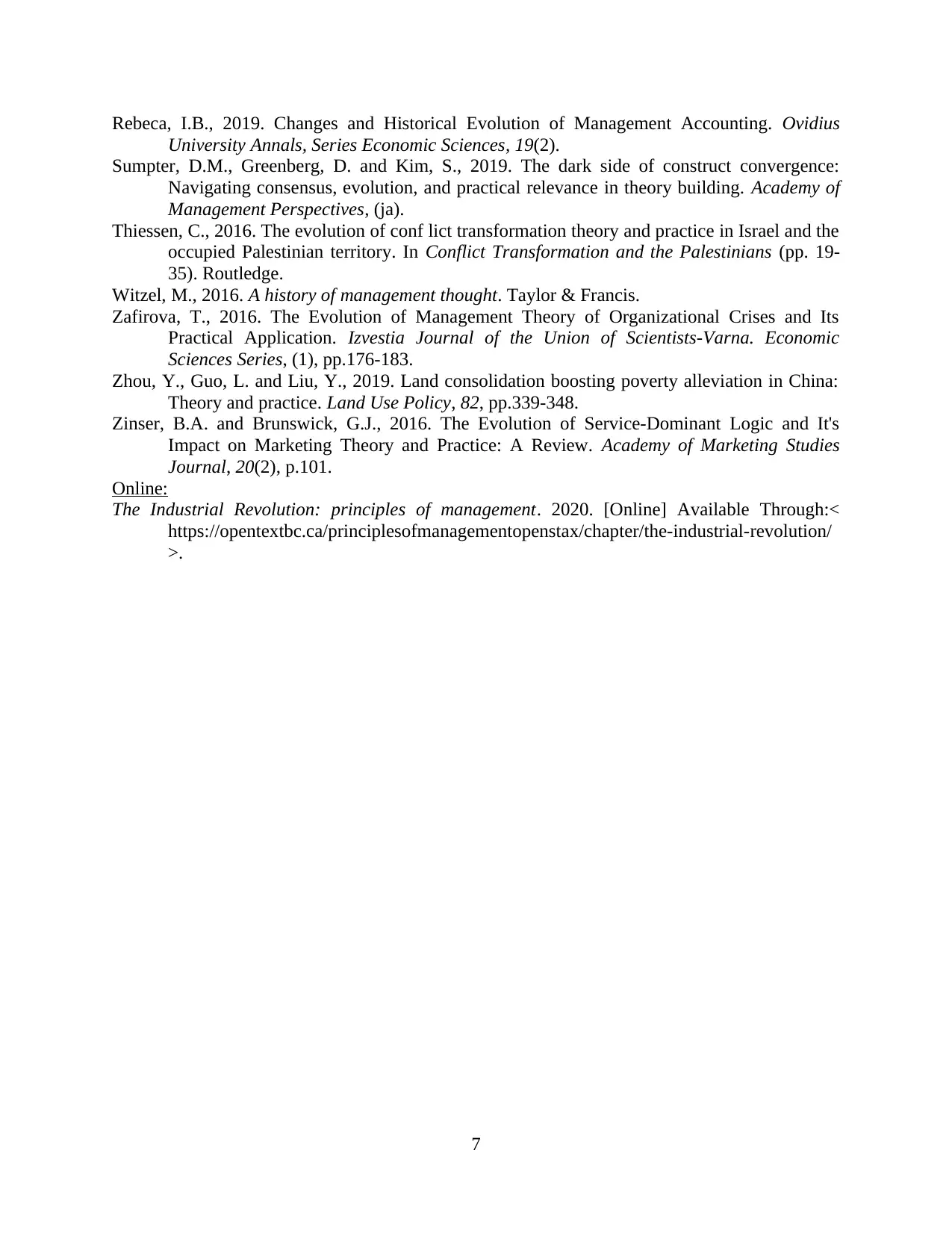
Rebeca, I.B., 2019. Changes and Historical Evolution of Management Accounting. Ovidius
University Annals, Series Economic Sciences, 19(2).
Sumpter, D.M., Greenberg, D. and Kim, S., 2019. The dark side of construct convergence:
Navigating consensus, evolution, and practical relevance in theory building. Academy of
Management Perspectives, (ja).
Thiessen, C., 2016. The evolution of conf lict transformation theory and practice in Israel and the
occupied Palestinian territory. In Conflict Transformation and the Palestinians (pp. 19-
35). Routledge.
Witzel, M., 2016. A history of management thought. Taylor & Francis.
Zafirova, T., 2016. The Evolution of Management Theory of Organizational Crises and Its
Practical Application. Izvestia Journal of the Union of Scientists-Varna. Economic
Sciences Series, (1), pp.176-183.
Zhou, Y., Guo, L. and Liu, Y., 2019. Land consolidation boosting poverty alleviation in China:
Theory and practice. Land Use Policy, 82, pp.339-348.
Zinser, B.A. and Brunswick, G.J., 2016. The Evolution of Service-Dominant Logic and It's
Impact on Marketing Theory and Practice: A Review. Academy of Marketing Studies
Journal, 20(2), p.101.
Online:
The Industrial Revolution: principles of management. 2020. [Online] Available Through:<
https://opentextbc.ca/principlesofmanagementopenstax/chapter/the-industrial-revolution/
>.
7
University Annals, Series Economic Sciences, 19(2).
Sumpter, D.M., Greenberg, D. and Kim, S., 2019. The dark side of construct convergence:
Navigating consensus, evolution, and practical relevance in theory building. Academy of
Management Perspectives, (ja).
Thiessen, C., 2016. The evolution of conf lict transformation theory and practice in Israel and the
occupied Palestinian territory. In Conflict Transformation and the Palestinians (pp. 19-
35). Routledge.
Witzel, M., 2016. A history of management thought. Taylor & Francis.
Zafirova, T., 2016. The Evolution of Management Theory of Organizational Crises and Its
Practical Application. Izvestia Journal of the Union of Scientists-Varna. Economic
Sciences Series, (1), pp.176-183.
Zhou, Y., Guo, L. and Liu, Y., 2019. Land consolidation boosting poverty alleviation in China:
Theory and practice. Land Use Policy, 82, pp.339-348.
Zinser, B.A. and Brunswick, G.J., 2016. The Evolution of Service-Dominant Logic and It's
Impact on Marketing Theory and Practice: A Review. Academy of Marketing Studies
Journal, 20(2), p.101.
Online:
The Industrial Revolution: principles of management. 2020. [Online] Available Through:<
https://opentextbc.ca/principlesofmanagementopenstax/chapter/the-industrial-revolution/
>.
7
1 out of 10
Related Documents
Your All-in-One AI-Powered Toolkit for Academic Success.
+13062052269
info@desklib.com
Available 24*7 on WhatsApp / Email
![[object Object]](/_next/static/media/star-bottom.7253800d.svg)
Unlock your academic potential
Copyright © 2020–2026 A2Z Services. All Rights Reserved. Developed and managed by ZUCOL.





